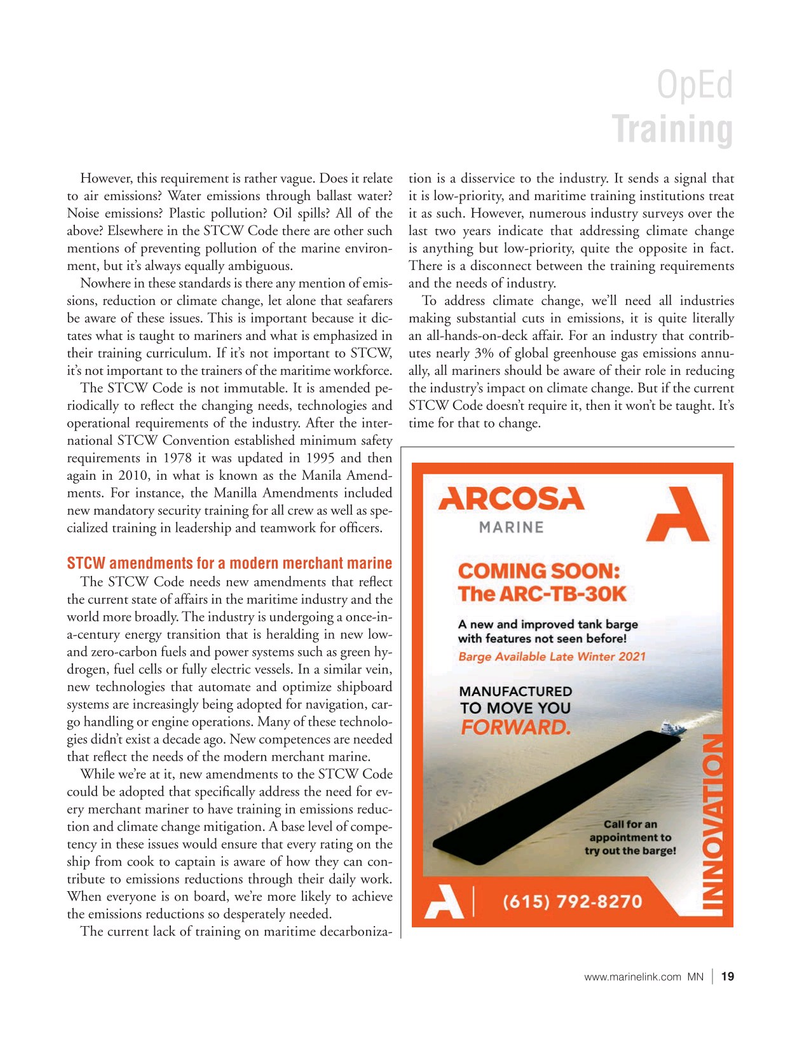
Page 19: of Marine News Magazine (March 2021)
Pushboats, Tugs & Barges
Read this page in Pdf, Flash or Html5 edition of March 2021 Marine News Magazine
OpEd
Training
However, this requirement is rather vague. Does it relate tion is a disservice to the industry. It sends a signal that to air emissions? Water emissions through ballast water? it is low-priority, and maritime training institutions treat
Noise emissions? Plastic pollution? Oil spills? All of the it as such. However, numerous industry surveys over the above? Elsewhere in the STCW Code there are other such last two years indicate that addressing climate change mentions of preventing pollution of the marine environ- is anything but low-priority, quite the opposite in fact. ment, but it’s always equally ambiguous. There is a disconnect between the training requirements
Nowhere in these standards is there any mention of emis- and the needs of industry. sions, reduction or climate change, let alone that seafarers To address climate change, we’ll need all industries be aware of these issues. This is important because it dic- making substantial cuts in emissions, it is quite literally tates what is taught to mariners and what is emphasized in an all-hands-on-deck affair. For an industry that contrib- their training curriculum. If it’s not important to STCW, utes nearly 3% of global greenhouse gas emissions annu- it’s not important to the trainers of the maritime workforce. ally, all mariners should be aware of their role in reducing
The STCW Code is not immutable. It is amended pe- the industry’s impact on climate change. But if the current riodically to re? ect the changing needs, technologies and STCW Code doesn’t require it, then it won’t be taught. It’s operational requirements of the industry. After the inter- time for that to change.
national STCW Convention established minimum safety requirements in 1978 it was updated in 1995 and then again in 2010, in what is known as the Manila Amend- ments. For instance, the Manilla Amendments included new mandatory security training for all crew as well as spe- cialized training in leadership and teamwork for of? cers.
STCW amendments for a modern merchant marine
The STCW Code needs new amendments that re? ect the current state of affairs in the maritime industry and the world more broadly. The industry is undergoing a once-in- a-century energy transition that is heralding in new low- and zero-carbon fuels and power systems such as green hy- drogen, fuel cells or fully electric vessels. In a similar vein, new technologies that automate and optimize shipboard systems are increasingly being adopted for navigation, car- go handling or engine operations. Many of these technolo- gies didn’t exist a decade ago. New competences are needed that re? ect the needs of the modern merchant marine.
While we’re at it, new amendments to the STCW Code could be adopted that speci? cally address the need for ev- ery merchant mariner to have training in emissions reduc- tion and climate change mitigation. A base level of compe- tency in these issues would ensure that every rating on the ship from cook to captain is aware of how they can con- tribute to emissions reductions through their daily work.
When everyone is on board, we’re more likely to achieve the emissions reductions so desperately needed.
The current lack of training on maritime decarboniza- www.marinelink.com MN 19|

 18
18

 20
20
